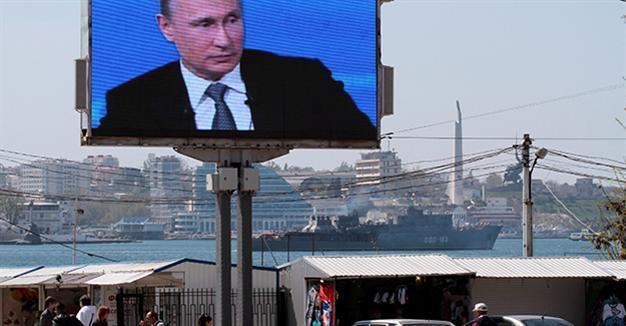Ankara reiterates support for Crimean Tatars, decries Russian ‘occupation’
ANKARA

People walk under an electronic screen showing nationwide call-in attended by Russian President Vladimir Putin on a street of the Black Sea port of Sevastopol, Crimea, April 14, 2016 - REUTERS photo
Ankara has voiced strong support to the Crimean Tatars while decrying Russia’s 2014 “occupation” of Crimea on the occasion of the anniversary of the 1944 deportation of some 200,000 Tatars from Crimea.
“Turkey will not forget or allow anyone to forget the grievances which originated from this atrocity that aimed at erasing a people from history and will continue standing by the Crimean Tatars in their democratic, peaceful and righteous struggle,” Turkish Foreign Ministry Spokesperson Tanju Bilgiç said in a written statement released on May 17.
“The wounds that this atrocity has opened are still fresh in the memory of the Crimean Tatar people and of Turkey, which received their kin during their difficult days. Russia’s occupation of Crimea and its illegal annexation has once more twisted the knife in these wounds 70 years after the exile,” Bilgiç said in his statement, which came in the form of an official answer to a journalist’s question.
“On the anniversary of the exile, we condemn this ethnic cleansing which passed into history as a black spot,” he said.
On May 16, Turkish President Recep Tayyip Erdoğan, in a phone call, congratulated Ukraine’s Jamala, a 32-year-old Crimean Tatar, for her Eurovision victory.
The U.N. human rights office said on May 17 Jamala’s victory “makes no difference on the ground” for Crimean Tatars, who have faced growing problems since Russia assumed control of the Black Sea peninsula in 2014 following a plebiscite.
Rupert Colville of the Office of the High Commissioner for Human Rights says some Tatars like Jamala “might take some solace that their story is not forgotten.”
At a U.N. briefing on May 17, Colville highlighted the May 18 anniversary of the deportation of some 200,000 Tatars, including Jamala’s grandmother, from Crimea in 1994 during World War II. Tens of thousands returned since.
He said the situation of Tatars has “deteriorated” since the Russian annexation, citing issues like arbitrary searches, the shutdown of media outlets and a ban on a Tatar assembly.
